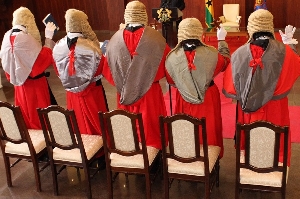Ghana Commercial Bank (GCB), the best performer on the Ghana Stock Exchange for 2002, has recommended a final dividend of 350 cedis per share amounting to 57.950 billion cedis for shareholders due to appreciable capital gains and an after-tax profit of 174.372 billion cedis.
This is in addition to an interim dividend of 150 cedis per share amounting to 24.550 billion cedis brings the total dividend per share to 500 cedis that comes to 82.500 billion cedis.
Mr. Kwabena Osei-Bonsu, Chairman of the Board of Directors, made these disclosures at the Bank's 9th Annual General Meeting (AGM) on Friday, for its 80,000 shareholders. The meeting was to enable the Board Members present the 2002 Annual Report and Account to the shareholders and to re-elect past directors and elect new ones for the operations of the bank.
This year also marks the 50th anniversary of the Bank's existence and activities for its celebrations would end in June.
Profit before tax for 2002 stood at 281.908 billion cedis against the previous year's mark of 296.962 billion cedis. After making provisions for the Reconstruction Levy and corporate tax, profit after tax came to 174.327 billion cedis, representing an increase of three per cent over that of 2001. The Board Chairman said total income for the period stood at 695.088 billion cedis registering a growth of 38 per cent over the operating expenditure in 2001.
He said the Bank registered a total return of 153 per cent made up of 124 per cent in capital gains and 29 per cent income yield adding that the average gain on the market over the same period was 45 per cent.
Touching on both the international and domestic environment in which the bank operated, the Board Chairman said the world economy showed a marked growth in the first quarter of 2002 reflecting a robust six per cent growth of the United States economy as well as rates of 4.3, 4.4 and 3.0 per cent for Canada, Denmark and Japan in that order leading many to believe that economic recession had abated.
However the growth prospects of the world economy stagnated after the first quarter necessitating a downward revision and the projected world
outlook for 2003 was reduced from four per cent to 3.7 per cent.
Mr. Osei-Bonsu said these developments impinged on the domestic economic performance, which among other things made the cedi to depreciate by 15.4 per cent against the dollar during 2002 with inflation at 15.2 per cent resulting in a marginal real depreciation against the major currencies.
He said in furtherance of the Bank's objectives to improve and continue its recent achievements, the Board and Management had approved a new corporate plan to focus on shareholder value and customer satisfaction covering the period 2002 to 2004.
Mr. Osei-Bonsu said though the fall of interest rates with its attendant dwindling margins in the economy continued to affect the performance of banks, the resilience brought in by the new corporate plan as well as prudent management practices moderated the effect on the GCB.
He said the new corporate plan was designed to enhance profitability, improve the preferences of staff and the effectiveness of the organisation as well as to effect change in GCB's culture.
Mr. Osei-Bonsu expressed the hope that shareholders as well as the numerous customers of the Bank would give their total commitment and co-operation to the Management and Staff to enhance its financial stature and investor appeal.
Business News of Sunday, 30 March 2003
Source: .












